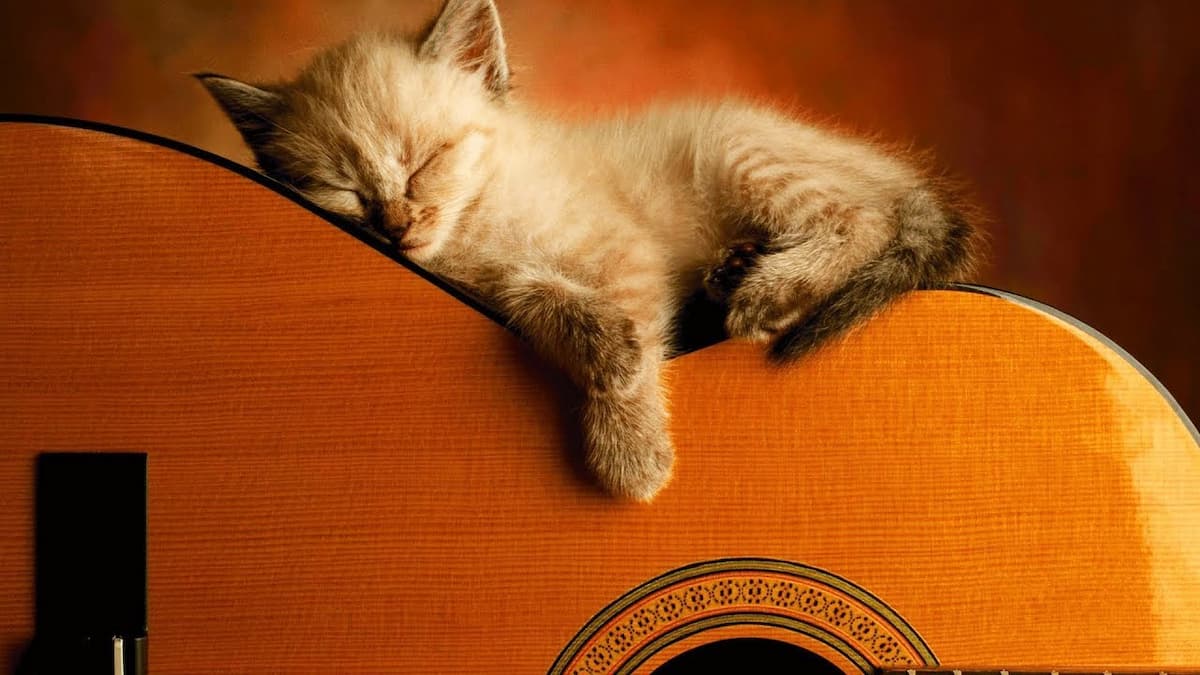If you’re a cat owner, you’ve probably noticed how your furry friend can get easily irritated by loud noises or sudden movements.
Fortunately, there might be a solution that calms your cat’s nerves: classical music.
Studies have shown that classical music has a calming effect on both humans and animals. The soothing melodies and slow rhythms of certain pieces of classical music can help reduce stress, anxiety and even lower blood pressure.

The Science Behind Classical Music and Cats
So how does this work?
A study about this phenomenon came out in 2019: “Effects of music on behavior and physiological stress response of domestic cats in a veterinary clinic,” published in the Journal of Feline Medicine and Surgery.
The authors wanted to investigate the “effects of music on behavior and physiological stress response of domestic cats in a veterinary clinic.”
So they put on a recording of Gabriel Fauré’s Élégie for cello, along with a simultaneous audio of purring, and tested the cats’ stress levels in multiple ways during their veterinary exams.
Gabriel Fauré, Élégie Op. 24 (1880)
Their conclusion was that music did indeed lead to more positive outcomes at vets’ offices.
However, they were unable to determine if the cat-specific audio or the classical music was helping the most. The researchers urged more experimentation.
How to Use Classical Music With Your Cat
Here are some tips on how to introduce classical music to your cat:
1. Choose the Right Music
Not all classical music is created equal when it comes to calming cats. While some pieces may have a positive effect, others may have the opposite effect and increase stress levels.
There’s no need to blare something like Carl Orff’s O Fortuna at your cat while you’re trying to get relaxed (even if your cats might be very excited to hear the word “tuna”). Remember, it’s essential to choose music with a slow tempo and a gentle melody.
Carl Orff: O Fortuna – Carmina Burana
2. Create a Relaxing Environment Apart From the Music
Create a calming environment for your cat to enjoy the music in. Make sure the room is quiet, comfortable, and free from distractions.
It won’t do your anxious kitty any good if you put on calming music only for boisterous children or barking dogs to break the mood!
3. Introduce the Music Gradually
Start by playing the music softly in the background while you’re in the room with your cat. This will help them get used to the sound and associate it with a positive experience.
Once your cat is comfortable, you can increase the volume and play the music for longer periods.
4. Finally, Start Using Music During Stressful Situations
After you’ve started to use classical music in a controlled environment, and your cat associates the music with a soothing atmosphere, it’s possible it might start helping during stressful situations, such as visits to the vet, or when there’s construction work happening nearby.
By playing calming music, hopefully, you can help your cat feel more at ease and reduce their stress levels.
What’s the Purrfect Music for Cats?
Like we’ve said, you’ll want to use classical music with slow tempos and gentle melodies.
Here are some examples of classical pieces that might fit the bill:
Johann Sebastian Bach: Air on the G String
Frédéric Chopin: Nocturne in E-flat Major, Op. 9, No. 2
Erik Satie: Gymnopedie No. 1
That said, the researchers at the Journal of Feline Medicine and Surgery suspect that their cats may have been responding to the recordings of cat sounds more than the music itself, so you may want to add in cat-specific recorded sounds, such as purring and grooming, to cover all your bases!
Musician David Teie has released tracks meant to calm cats. They are gentle and relaxing and feature simple instrumental music and prominent purrs. It’s deeply relaxing listening, even for a human!
Remember, every cat is unique and will have its own preferences when it comes to music and sounds.
To find the best fit for your cat, experiment with different types of classical music and observe how it responds to what it hears.
By choosing the right music, creating a relaxing environment, introducing music gradually, and employing it during stressful situations, you can help your furry friend feel more relaxed and at ease.
So why not try it out today and see how your cat responds to calming classical music?
For more of the best in classical music, sign up for our E-Newsletter


What a wonderful article on cats and music . The pictures are adorable as is the music ! I had a cat once, called Bruno, who loved to dance gently with me, head on my shoulder, face against my cheek, to the singing of Norah Jones. He is now in cat paradise but those memories are so precious.